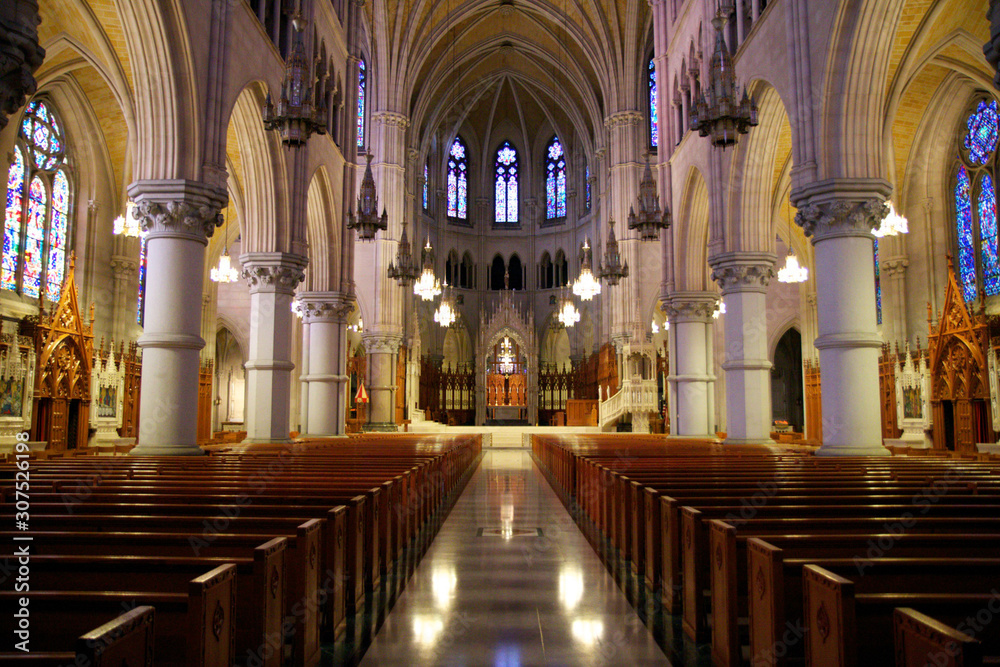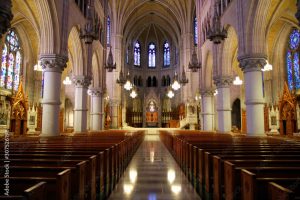February 28, 2025
Have you ever heard of a practical atheist? That is what Saint John Paul II called a person like me. I intellectually believed in God but was living as if He didn’t exist. I was Catholic, I had received all of my sacraments in the Church but my life said otherwise. Let’s go back to that first commandment, “I am the Lord your God; you shall have no other gods before Me.” Fr. John Riccardo of ActsXXIX talks in one of his podcasts about false gods—things we worship besides God. He recommended a book Counterfeit Gods by Timothy Keller. In 1993 when SJP2 was having World Youth Day, what was my generation being taught by our culture to worship?
I met my first husband in 1993, the summer after I graduated from college. He had spent five years in the military and was a veteran of Desert Storm. He and I were both raised Catholic, neither of us were practicing, but I wanted to get married in the Catholic Church. When we met, not going to Mass didn’t seem strange to me. Remember, I was taught that talking to God was the most important thing, going to church was good but not required. Now, I want to be clear—I don’t blame anyone for my lack of practice. At some point, I should have asked more questions about my faith… but I didn’t. My life was goal-oriented: make a schedule, be disciplined, and accomplish the goal as I learned from all the self-help books I read. Church was just something off to the side, it only overlapped with the rest of my life when there were marriages, baptisms or funerals.
Sadly, our marriage ended in less than seven years and I became a divorced single mom of my two wonderful children who were both under five, at age thirty-two. I should say at this point that my first husband and I have always remained friends. At the time of our divorce, we agreed that our kids would always come first—and we have kept that promise. I’m grateful that our words were always kind with one another and our relationship was without drama and cooperative. Still, in a matter of weeks our lives and the lives of our children were turned upside down. The home we purchased together sold quickly and the kids and I moved into a small four-bedroom Colonial that I could afford in my hometown.
In the midst of all this transition, I went to see the priest who had married us. I talked to him about everything, and he suggested I start the process of annulment. He gave me a book, Annulment: The Wedding That Was, and the paperwork. He strongly encouraged me to complete it—and he would handle the rest. I left his office unsure of how to feel.
I had gotten married in the Catholic Church. It was important to me. I had refused to get married on a beach or at a destination wedding because I wanted it to be in the Church, that meant something to me. But what? I had no doubts when I walked down that aisle—I was marrying a man I loved, what did I do wrong? While I wasn’t angry at God, I didn’t understand. Did I believe that just getting married in the Catholic Church would protect my marriage from being a divorce statistic? I never completed the paperwork, and the book was placed on my book shelf.
Fr. Riccardo explains in The Rescue Project that God has a plan for our lives and He is a good and loving God—but there is another player on the stage who does NOT will our good. Now, if you read my last post, Fr. Mike Schmitz pointed out in his homily that the person who mentions satan the most in the Bible is Jesus. A notable Bible verse says: “Put on the armor of God so that you may be able to stand firm against the tactics of the devil.” (Ephesians 6:11)
We baptized our children and went to church on occasions, but was that enough? Were we putting on the armor of God? No, we weren’t. Here’s where someone steps in to say that they have been happily married for thirty years and they don’t practice any religion. My response is simple, God wrote on every heart the moral law, what we usually refer to as conscience. He created the commandments for us not for Him, to keep us safe in a broken world where there are many disordered hearts. Only He knows what every single human heart ever created is capable of when it is disordered. It would be like saying you crossed the street without looking both ways once, you lived, so no one on the face of the earth should bother ever looking both ways. We can’t all get lucky.
Fast forward to my coming back to the Catholic Church, meeting with a priest and sharing my history, a second failed marriage. As you’ll recall from my last post, I’m a marathon runner, I don’t give up easily, how have I managed to be divorced twice when all I had ever wanted was to be a wife and a mother. He listened with kindness and understanding and when I finished creating a puddle on his floor he said, “I think you will find this process very healing.” He handed me the annulment paperwork, then said, “Keep coming to Church”. It was a lot of paperwork, but writing it all down was part of the healing process. The Church, founded by Jesus, understands the human heart.
To be clear, I am not an advocate for divorce. I believe that divorce is tearing apart our families, having a negative impact on our society and I don’t want it to happen to anyone. In my mind the best way to prevent something is to treat the cause. We need to truly understand what marriage is as God created it to be. Understand that our culture does not have the answers but God does. The first self help book anyone should read should be the Bible. I hope that our younger generations will see the mistakes made by generation X and learn from them.
Civilly, a divorce dissolves the ‘entity’ that is created by marriage in the state, dissolving the corporation. A corporation provides goods and services in exchange for payment and makes contracts with other entities. Marriage is a covenant, not a contract. The book is very helpful in explaining the difference between a sacramental marriage and a nonsacramental marriage. Foster writes “In a Christian marriage ‘The man gives the sacrament to the woman, and the woman gives the sacrament to the man under the light of grace….’ The Church teaches that it is the consent of the two ministers (the man and the woman) that brings about the sacrament of marriage. The Catechism of the Catholic Church states: The Church holds the exchange of consent between the spouses to be the indispensable element that ‘makes the marriage’. If consent is lacking there is no marriage.” To petition the church for a declaration of nullity, is providing evidence that conditions did not exist for a covenant to have taken place. You don’t have to be Catholic “the Church affords any divorced person the right to petition for a declaration of nullity”.
Divorce is a difficult topic because so many people are affected by it. Jesus’s teachings on divorce are difficult too, but try to remember that we are all going to have to work on something in this lifetime, if not divorce, then something else. If divorce is something that has impacted your life, I highly recommend talking to a priest and picking up the book. I cannot adequately convey to you the healing that I have experienced and continue to experience especially during Communion.
Now think about how the culture we live in defines love and marriage. Is it actually about sacrifice, becoming the men and women that God created us to be, for the good of each other and the children created of that covenant? Or does our culture teach that it is more of a business arrangement? Two people can afford nicer things together than they can on their own so why not get married. It’ll be fine, it’s just like roommates with the added benefit of sex. If it’s not working down the road, we’ll divide our stuff and go our separate ways. The culture will even suggest that it is best to draw up a contract before hand, just to make sure it is clear who will keeps what when one party is not living up to their end of the contract. That is NOT what God created marriage to be.
I wonder what would happen if we imitated the people in Siroki-Brijeg, Bosnia-Herzegovena, a city with no divorce. From Matthew Kelly’s book 33 Days to Eucharistic Glory, “After saying their vow, the bride and groom do not kiss one another. They both kiss Jesus on the Cross – only then do they kiss each other”.
St. Thomas Aquinas defines love as “to will the good of the other for the other’s sake.” At Mass last week, the readings were about forgiveness. Offering forgiveness to our brothers and sisters can be so difficult, but is always the way. In the reading last week, David spared Saul, when he could have easily killed him, but instead he recognized that Saul was also God’s anointed one, Saul was just listening to satan instead of God. It seems clear to me that in a similar way, we are all vulnerable to being used by satan, so beware of the snare!
It’s coming upon Easter season. If you haven’t been to church in a while, this is a great time! You don’t have to be Catholic to go, you just can’t receive the Eucharist. Instead of receiving the Eucharist, you can receive a blessing, just cross your arms over your chest forming an “X”. If you are Catholic but haven’t been in a bit, check confession times at your local parish. You might find that healing awaits you, too.
Cheerfully in Christ,
Karen
Annulment_the_Wedding_that_was
📽️ Watch: What Does It Mean to Be a Practicing Catholic?
The Jeff Cavins Show (Your Catholic Bible Podcast)
📖 33 Days to Eucharistic Glory – Learn more here.
⛪ Find a Mass Near You – If you’re looking for a Mass while traveling or need a schedule, visit MassTimes.org.
📚 Counterfeit Gods by Timothy Keller – Check it out here.
🎧 The Jeff Cavins Show (Your Catholic Bible Podcast) – Available on most podcast platforms, this show dives into Scripture and helps us apply it to our daily lives.
🎙️ You Were Born for This with Fr. John Riccardo – They are currently offering explanations of the first readings at Mass. You can listen to the latest episode here:
Listen on Apple Podcasts
Sunday’s Reflection
On Sunday, February 23, 2025, the Catholic Church celebrated the Seventh Sunday in Ordinary Time. The first reading at Mass was:
📜 1 Samuel 26:2, 7-9, 12-13, 22-23


